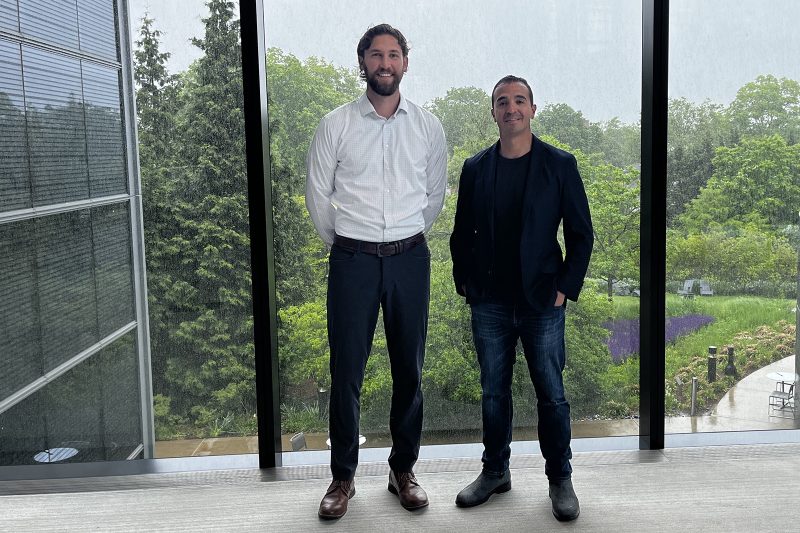The startup venture grew out of a Jackson School class project led by Stephen Coles (left) and Michael Gaviria (right).
Picture this: a magnitude 7.2 earthquake strikes San Francisco in the dead of night. As local and federal officials scramble to assess the damage and plan a response, they have a sophisticated new dashboard in front of them with real-time, on-the-ground data—informed by commercial satellite imagery and Tweets, with analysis by artificial intelligence.
That’s the vision for a new startup venture just launched by a group of Yale students, including Jackson graduate students Stephen Coles MA/MBA ’23 and Michael Gaviria MAS ’23.
The idea for the company, called Klarety, sprung from a class project in GLBL 6611, a year-long course on artificial intelligence, emerging technologies, and national power taught by Jackson School lecturer Ted Wittenstein.
Both Coles and Gaviria served in the military before coming to Jackson, and were interested in ways to improve humanitarian assistance and disaster relief. Gaviria honed in on the idea of using AI to analyze satellite imagery, giving emergency response officials an immediate and more accurate picture of the situation on the ground.
He teamed up with Coles and the pair recruited additional Yale students to the team, including Yale College junior Braden Wong, who has overseen coding and technical work on the platform; School of the Environment PhD student Yichen Yang, who focused on building out the satellite imagery analysis tool set; and Jackson grad student Alex Casendino, who assisted with data selection and management.
Jackson Senior Fellow Ambassador Harry Thomas’ course on global crisis response also provided useful context on challenges faced by the U.S. State Department and Federal Emergency Management Agency (FEMA) officials in the aftermath of a disaster.
“The Jackson community helped us hone our idea from the beginning. We spoke with classmates and faculty who are technical experts, have worked on the ground in disasters, have led crisis response organizations, and have built software products like ours,” said Coles. “Additionally, everyone who comes here wants to work on pressing global issues, so people were eager to share their expertise.”
For Wong, working on the project has been a “uniquely satisfying” way to bring together his technical skills and academic background in policy. It’s also been a chance to interact with a fun group of people from across the university, he said.
The team hopes to pilot the dashboard with the State Department and then build out from there, eventually expanding their client list to include the UN and other international agencies.
“Climate change is going to influence natural disasters. The intensity and frequency of these disasters will continue to rise, and that will have an impact on natural disasters, but also humanitarian assistance efforts to include civil wars and refugee movement,” Gaviria explained.
“We think that there’s going to be a need for more effective data collection, and the opportunity to then provide that data to organizations to be more responsive when these disasters or humanitarian aid situations do arise,” he said.
In the case of an earthquake, for example, the dashboard would pull in relevant data from social media and seismic labs and plot it geospatially on a map. Machine learning algorithms could rapidly identify where damage has occurred. End users could quickly generate custom reports tailored to their information needs.
Consider the response to the massive earthquake that hit Turkey and Syria in February 2023. Initial reports indicated that about 2,500 people were killed, but the final death toll was closer to 50,000, not to mention hundreds of billions in damage by the 7.8 magnitude quake. The goal of Klarety is to narrow that gap and provide more accurate data during the first 12-24 hours after a disaster strikes.
While the company is still in its very early stages, its advisors see big potential.
“Student projects that lead to startup companies, such as Klarety, are an exciting example of how the Schmidt Program bridges the divide across the law, technology, and policy communities at Yale,” said Wittenstein, who also serves as executive director of International Security Studies and its various research programs at the Jackson School.
“We are equipping our Jackson students with the requisite technical fluency to identify and respond to emerging opportunities—in this case the use of artificial intelligence for commercial imagery analysis in order to aid humanitarian assistance and disaster relief operations. I’m inspired by this interdisciplinary group of students, whose diverse backgrounds span the fields of global affairs, business, and computer science,” he added.
